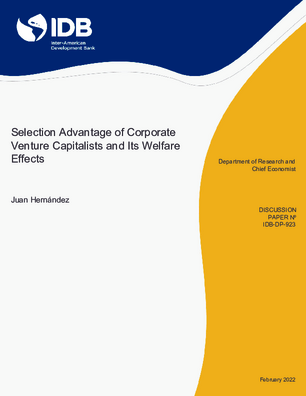Selection Advantage of Corporate Venture Capitalists and Its Welfare Effects
Date issued
Feb 2022
Subject
Entrepreneurship;
Startup;
Finance;
Venture Capital;
Competitiveness;
Financial Intermediary;
Knowledge;
Small Business;
Bank Loan
JEL code
D86 - Economics of Contract: Theory;
O32 - Management of Technological Innovation and R&D;
O36 - Open Innovation;
G39 - Corporate Finance and Governance: Other;
L24 - Contracting Out • Joint Ventures • Technology Licensing
Category
Discussion Papers
We develop a theoretical framework for corporate ventures where corporations' know-how gives them an advantage over regular financiers in identifying profitable projects. Corporations and venture capitalists compete to fund entrepreneurs in an environment featuring risk, adverse selection, and limited liability. The expected surplus of each project is independent of the financier and the efficient scale of each project differs among entrepreneurs. We characterize the
optimal financial contracts arising in equilibrium and use this characterization to explore the effect corporations' knowledge has in this environment. We show that the presence of corporations in the financial market could be detrimental to welfare when corporations' selection advantage is small. When large, corporate venture capitalists' knowledge reduces the extensive margin inefficiency arising from adverse selection, meaning less socially inefficient projects are enacted. We also show that increasing the depth or breadth of corporations' knowledge leads to
higher aggregate gains.
optimal financial contracts arising in equilibrium and use this characterization to explore the effect corporations' knowledge has in this environment. We show that the presence of corporations in the financial market could be detrimental to welfare when corporations' selection advantage is small. When large, corporate venture capitalists' knowledge reduces the extensive margin inefficiency arising from adverse selection, meaning less socially inefficient projects are enacted. We also show that increasing the depth or breadth of corporations' knowledge leads to
higher aggregate gains.



